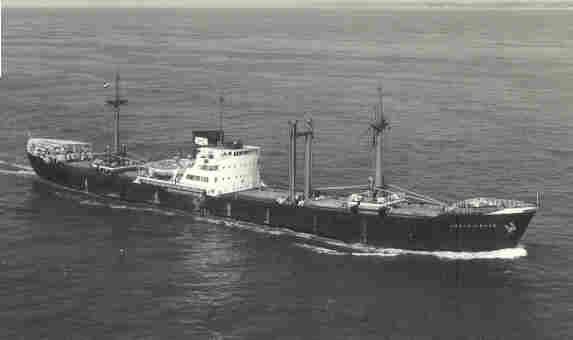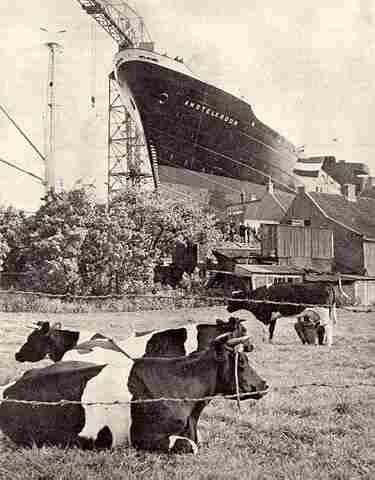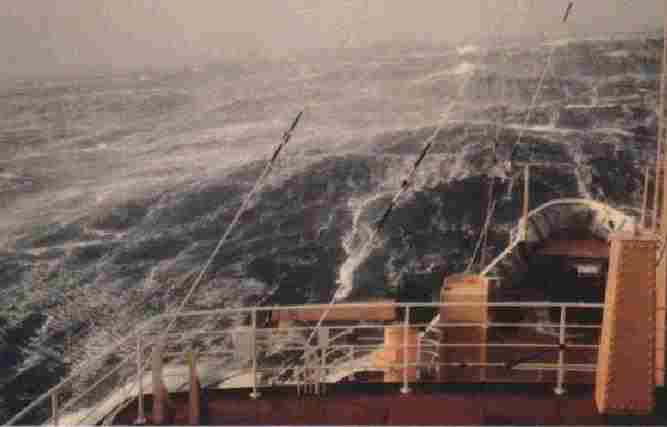
![]()
ms Amstelkroon

Ship was built in 1952 at the now extinct yard Vuijk at Capelle a/d Yssel, just at the other side of the river from were I live now. Length: 141 meters. Tonnage: 8010. Single stroke 2-tact diesel main engine of 4200 horse power. Speed 12,5 knots. Ships was decommissioned in 1968.

The yard Vuyk was what we called a 'farmer's yard', a rather small yard usually family owned (indeed the owners name was Vuyk) located in a small town along the river front. Most of the yard's workforce was living just over the dyke and went home for lunch wearing the standard blue overall and the old wooden shoes. Quite a sight. In 1951, when the ship's keel was laid, Capelle a/d Yssel was a big village or small town lying on the borders of the river Yssel, hence the name Capelle on the Yssel. As can be seen from this picture the Amstelkroon was built in a rather peculiar rustic setting.
The captain on board this ship was one of the few - in my experience anyway - who was always wearing his war time distinctions pinned on his uniform. During this more or less post war period I sailed with many a Dutch captain who had been on active sea duty during the entire second World War. Some of them had hardly escaped and survived many of the worst war atrocities ranging from bomb attacks on their ships to nightmarish scenes in which they had to plough with their ships through a sea covered with seaman lying in the water. Only a little while before those seamen were on board ships but had the bad luck to be torpedoed by a German sub while steaming in the forward part of the convoy. When this happened during night time those on board of the ships and still in the convoy could see a field of small red lights of the unlucky seamen's Mae West life jackets in the water ahead, to the left to right. And they could also hear the cries of these colleagues. Most Dutch captains did not like to show off their too often hard gained distinctions and that is more or less in the Dutch tradition of modesty. Generally we don't like others to get to intimate with our lives and feelings and to show off in any way. For example in Holland sales of Rolls Royce's and Bentley's are not so hot and such cars are almost never seen on the roads. Without any doubt the money is there to buy such cars. At the most an ordinary type of Mercedes or BMW or often even lesser a car is used, not too conspicuous please. The same with housing, not too exorbitant, no display of great wealth if possible. Except for the Nouveau Riches or Parvenu's of course. Like a recently elected Minister here in Holland who acquired his capital in a few years time with a media type of business which he sold for 150 million Dutch guilders. The official government Mercedes is something he is avoiding. He fancies to drive up to parliament in his Bentley instead. His mansion also reflects his NR ideas in this respect. But he and the others are exceptions. But I am drifting away from my target.
The trip with this ship via Bremen in Germany to Trois Rivières or Three Rivers in Canada was not a pleasure trips in more than one way. The captain was cross with me from day one as due to an emergency transfer from my previous ship the Sibajak, I joined the ship without my luggage, and thus without my uniform which was still on board the Sibajak in Rotterdam. The Amstelkroon's radio officer reported sick just before the departure of the ship. So I was transferred from my very short stay at home in Rotterdam to Amsterdam were the Amstelkroon was lying. No time to fetch my things on board the Sibajak. Although I explained the situation to the captain when arriving on board, tugboats and pilot already present and waiting, he blamed me anyway and never forgave me as it turned out. This omission, in fact done at the urgent request of the owners Reederij Amsterdam, was for the best of that company, I thought. It probably saved a lot of money. Nevertheless he ordered me to eat at the second table settings only, as he did not want to see me around in the mess room in my civilian suit during the first setting. Such a sight seemed to spoil his appetite. I tried to explain to him that this would interfere with my watch keeping schedule and certain times of transmissions such like weather messages, but he told me not to eat then. That were the last words he ever spoke to me. From that moment on the first officer was the liaison officer or errand boy between the captain and myself. Nice. Via Bremen, Germany and with an empty ship we sailed to the north and between Scotland and the Shetland Islands towards Canada. The weather was very bad and became worse. We hit a storm which lasted for four days during which time we had no idea what our position was. With the empty ship lying high in the water we became a tiny thing with which the storm could play around at will.

We hardly made any speed at all, just riding out the
storm. During these days I made several radio direction finding bearings one
from a radio beacon on New Foundland and the other from an American air force base
at Greenland which indicated that we were nearing Greenland quite a bit. As this
did not fit the captain's ideas about our position I was ordered to stop my
direction finding exercises as they were inaccurate anyway and might confuse
others. After the storm
subsided and the sun broke through the clouds for the first time it was found
that my bearings were not so bad after all, on the contrary. However, no
comments were made. Only the third officer almost hugged me later on and told me
that he wished I could have seen the expression on the captain's face then. In Three
Rivers we started to load grain in the holds. During the loading time we received an
official safety inspection from the Canadian authorities. All the lifeboats had to be let down,
but one fell from the davits as an overripe fruit at the very moment that it swung free from the
ship. A deck lower a curious engineer, watching the exercise, was almost
beheaded when the lifeboat took its dive down. It was a wooden lifeboat and on
impact in the water it split wide open like a flower blossoming suddenly. It was
quite a sight. Panic all round and a lot of explaining had to be done.
Captains do not like such incidents as they reflect rather badly on them. Poor
maintenance conditions on board, sloppy seaman's ship and all that. But I did not care about that very
much I must admit. Another, fitting lifeboat was not available, so we got a much
bigger one on board, from a passenger ship so it looked, which was strapped down on
top of one of the fore ward holds. Everybody looked at it with disbelief. How we
had to get this lifeboat in operation and away from a sinking ship during an
emergency was a mystery to everybody, but the Canadian authorities saw it fit
for the renewal of the ship's safety certificate. The third officer mumbled that he was
curious how long the lifeboat would last out there in that prone position. How prophetic.
The elements were not with us on the return trip to Amsterdam either. And the third
officer was proven right as a few days later the lifeboat was smashed to smithereens
by a huge wave hitting the foredeck. Later only some ropes had to be
cleared as all the debris had been swept clean overboard by the angry North
Atlantic. Such human foolishness, it must have thought and hence away with it. In
the mean time I had asked the company to give me, please, a transfer to another
ship after arrival in Amsterdam and they did. I had to join the
ms Duivendrecht
lying in Hamburg. Oh boy, did I feel good again then. However, my destiny was
changed for good by a colleague's illness as it turned out. When boarding my
previous ship the Sibajak the idea was that I would make the two trips to New
York and then proceed to the Far East where I was to be employed on one of the
then many "always from home" ships for the usual period of about two
to three years. That intention was over permanently. One will never know which
course one's life would have taken if everything would have gone as originally
planned.